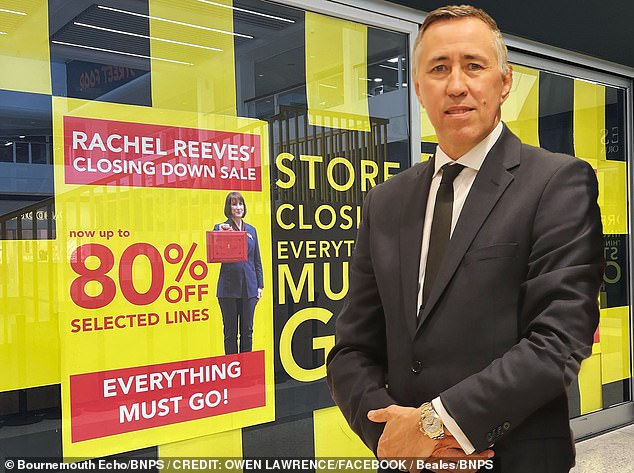The cyber attacks on three leading British retailers could barely come at a worse time for stores.
The High Street is already reeling from Rachel Reeves’ Budget barrage of National Insurance and national minimum wage rises, and reduced business rate relief.
Retailers – already on the ropes after the Covid pandemic and energy price increases – are ‘perplexed, flabbergasted and angry’.
But campaigners say Government could make policy changes to help struggling town centres.
Measures include free parking, business rate relief to be targeted at High Streets not retail parks, and planning reform.
For some, the situation – with retail sales falling for a seventh month in a row – is already too much. Department store chain Beales, dating back 140 years, is closing its last branch.

Budget battering: The ‘Rachel Reeves closing down sale’ at Beales’ last-remaining branch in Bournemouth – and chief executive Tony Brown
Chief executive Tony Brown said Reeves’ policies had cost the business £200,000. Giant posters of the Chancellor adorn the store in Bournemouth as it holds a ‘Rachel Reeves closing down sale’.
He says: ‘Labour has used business as an ATM. There’s not a business person who’ll say otherwise. It has done damage beyond repair.’
More than 300 miles north in Darlington, County Durham, Jane Robineau and her husband Fred confronted Treasury Minister James Murray when he visited their patisserie shop in December last year and told him small business owners were ‘crying around their kitchen tables’ about how to absorb the huge cost rises.
She is worried about another four years of Labour, and wants reductions in corporation tax. She pays 25 per cent like larger firms.
Andrew Massey, whose family-run DIY store in Swadlincote, Derbyshire, has been hit by £90,000 of extra costs from the Budget, said: ‘At the moment it seems private businesses are being hammered when we’re the building blocks of the economy.’
With extra costs being passed on as price rises, he added: ‘I wouldn’t be surprised if you see inflation jump as a result of this.’
Michael Hughes, who runs Tom Hughes clothing store in Narberth, on the Pembrokeshire coast, revealed his business was particularly hit by the National Insurance rise – having already had business rate relief cut by the Welsh government last year.
He said: ‘If someone only works one day a week, previously we wouldn’t have to pay National Insurance but now we do.’
Andrew Goodacre, head of the British Independent Retailers Association which represents 4,000 small-to-medium sized enterprises, said: ‘This is a Government that, prior to coming in, wanted to revitalise high streets.
‘What they’ve done is find ways of making it more expensive to run a shop. Our members are perplexed, flabbergasted and angry.’
Goodacre wants to see the restoration of free, time-limited parking. He accused council officials of being ‘short-sighted’ by focusing on parking revenue at the expense of the health of the High Street.
He urges ministers to axe business rate relief for retail parks too. In his home town of Solihull, in the West Midlands, both M&S and TK Maxx have relocated to the outskirts. Lower rates in town centres could, he believes, tempt large chains to stay put.
Goodacre also bemoans countless ‘lovely old buildings’ standing empty, and urges reform of planning rules so they can be ‘brought back to life’ quickly.
David Hale of the Federation of Small Businesses, which represents 150,000 firms, said: ‘People put their life and soul into setting up a business on the High Street.
‘We’re a long way off the positive growth agenda that you heard in the Election campaign.’
He adds of Labour: ‘There’s not been a single piece of legislation that’s designed to make it easier for small businesses to operate.’
The British Retail Consortium, representing 200 big retailers employing more than 2 million staff, says the decision to make scores of part-time workers – many of them women – subject to employer National Insurance
Contributions could be ‘the most significant’ of Reeves’ Budget measures. The organisation predicts 130,000 part-time jobs could be lost over the next three years – on top of 200,000 lost since 2018.
Chief executive Helen Dickinson said the lowering of the threshold at which employer National Insurance applies from earnings of £9,100 to £5,000 a year was ‘the most significant change’ adding she was ‘very worried’ about the impact of Labour measures on ‘valuable, flexible, part-time jobs’.
The consortium also estimated that a levy on packaging, to be introduced this autumn, would add a further £2 billion to costs.
Retail sales fell in April for the seventh successive month, according to the Confederation of British Industry, which expects a further drop in May.
Louise Hellem, the federation’s chief economist, said: ‘There is so much pain because it is on the back of so many difficult years.’
She points out that the workers’ rights legislation currently passing through Parliament will ‘through the Government’s own estimates, add a further £5 billion to the cost of doing business.’
DIY INVESTING PLATFORMS

AJ Bell

AJ Bell
Easy investing and ready-made portfolios

Hargreaves Lansdown

Hargreaves Lansdown
Free fund dealing and investment ideas

interactive investor

interactive investor
Flat-fee investing from £4.99 per month

InvestEngine

InvestEngine
Account and trading fee-free ETF investing
Trading 212
Trading 212
Free share dealing and no account fee
Affiliate links: If you take out a product This is Money may earn a commission. These deals are chosen by our editorial team, as we think they are worth highlighting. This does not affect our editorial independence.
This article was originally published by a www.dailymail.co.uk . Read the Original article here. .

